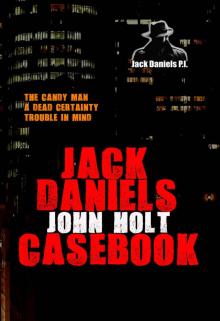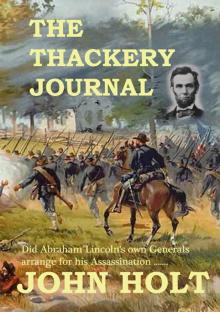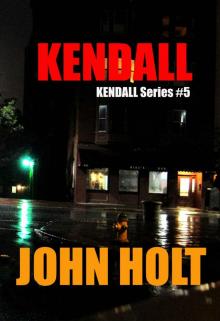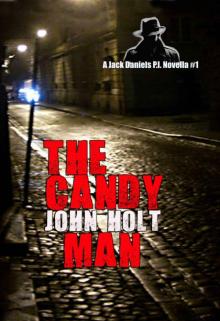The Kammersee Affair Read online
Page 35
* * *
Hartman sensed the train slowing down, and could hear his travelling companions stirring. He opened his eyes. “We are coming into Kassel,” said one.
“This is our station,” volunteered the other.
With that they collected their luggage, wished Hartman a pleasant journey, and disappeared into the corridor in readiness for leaving the train.
The train drew to a halt, with a violent jolt, as though the brakes were applied at the very last moment. Once again Hartman could hear the sound of doors opening, people clambering down the short flight of steps, and the doors slamming. His fellow travellers were gone, he thought with some satisfaction.
The train waited at Kassel, for a few minutes. In due course the signals turned to green, the stationmaster blew his whistle, and the train began to move once again, slowly at first and gradually increasing speed. Hartman was gratified that no other passengers had entered into his compartment. He returned to examining his papers in peace, without fear of interruption.
He first took out two small folders, headed Wolfgang Behr, and Walter Steiner. So they thought they would attempt to blackmail me did they. Thought they had got the better of me. Those two would live to regret their action.
He started to laugh. “Live, did I say? What I meant to say was the exact opposite,” he murmured. “They would die to regret their action.”
He started to read through the papers. There was very little in the files, merely a few personal details, and a service record. Both men had been loyal Nazis. Their military records were unblemished, although unremarkable. Both had led fairly ordinary lives, and there was nothing of any great significance, certainly nothing that he could have used against them. The only other items in the files were a number of photographs. There was nothing of any great value.
Not that it mattered, not now. “They will both be dead, quite soon now, won’t they?” He slowly closed the files, and placed them back inside the briefcase.
He then took out the remaining sheaf of papers. There were several sheets stapled together, and one single sheet. He took up the single sheet first. It was headed Ernst Richter, and dated February 1946. It contained a single paragraph giving details of his present whereabouts, and occupation. He operated a diving school, and also arranged diving trips. In this connection he had considerable experience diving in the Austrian lakes close to where he lived. The school and Richter’s home were located in Gmunden, a medium sized town at the northern end of Lake Traunsee, approximately forty kilometres west of Lake Toplitzsee.
Hartman then took up the final document. He was very pleased with this particular document, and he considered that it could prove very useful, very useful indeed. The document consisted of about twelve pages. It was headed Ernst Richter – Austrian Resistance – 1942 to 1944. The document was dated October 1944, and had apparently been stamped by the Gestapo. Each page was stamped with the German eagle, and the swastika.
The document gave full details of Richter’s involvement with the Austrian underground, during the war years. It also gave full details of Richter’s involvement with German High Command. It seemed that Richter had been paid by the Germans to spy on the underground movement. It gave full details of all projects that Richter had been involved with, and that had failed.
The document showed quite clearly that Richter had been a spy for Germany, and had betrayed many Austrians. As a consequence many had been executed. In short, the file contained a wealth of information that the Austrian authorities would be very glad to receive. It had to be said that some of that information was not exactly true. It was also worth noting that this document had been prepared, not in 1944, but three days previously.
Hartman was very proud of the document. It had been meticulously researched, and well put together, a testament to German efficiency. It was extremely well detailed. Everything had been included, and nothing had been left out. It was thorough, well written, and, most importantly, although much of the detail was true, the document was a fake. A massive forgery, produced with the help of some past acquaintances. It was a great big lie, a magnificent product of his imagination.
Hartman laughed aloud, and then immediately stopped and looked around. There’s no one else here, he said, so why should I worry. And with that he started laughing heartily once again.
After a short while, Hartman stopped laughing. He looked once more at the document in his hand, smiled, and placed it into his briefcase. He carefully closed the briefcase, locking it securely, and placed the key in his inside pocket. He placed the briefcase on the seat next to him, and was actually partially sitting on it. If anyone tried to take it, he would feel it. He looked at his watch. It was 1.45 in the morning. He looked out of the window. He could see nothing. He turned away from the window, and made himself comfortable. Then he closed his eyes, and went back to sleep.
Chapter Twenty-Five
Meister and Sons
Six hours later Hartman arrived at Munich Central Station. He walked across the concourse, and down the main entrance steps, out into the street. He turned to the left and walked to the taxi stand at the corner. As he got into the taxi at the head of the queue, he instructed the driver to take him to Leopold Strasse. The taxi headed southwest from the station, toward the industrial side of the town.
Hartman had not been in this area for some years, in fact the last time had been several years before the war. He could see that it had been badly damaged by bombing both from the Royal Air Force, and the US Air Force. The remains of ruined buildings were everywhere. The ones still intact were in a poor condition, and there were many vacant buildings. Hartman began to be worried that the building he required might also have been damaged, or, indeed, destroyed.
“Here we are,” said the driver, as they reached the corner with Leopold Strasse.
Hartman got out, paid the driver, and slowly started walking along the footpath. Approximately one hundred yards on the left hand side, he could see the familiar timber gateway. The building was still there. Was it still occupied though, he wondered. As he got closer he saw that the gates were now painted green. He remembered when he worked there they were a dark red. He noticed that the paint was faded and flaking in several places. He could still read the sign, Meister and Sons Transport Company.
When he had worked there, ten years ago, it was Steinburg Haulage. The adjacent building appeared to be undamaged. It was a two storey building, which used to be the offices down stairs, and living accommodation above. He wondered if it was the same now. He looked closer, and peered through one of the windows. The window was dirty, and difficult to see through, but he could see enough to suggest that it was still occupied.
As Hartman stood by the building he recalled the events of those years long gone by. Hartman had sold the company ten years ago. The company hadn’t actually been his to sell, but that had not stopped him. Abram Steinburg and his brother had been reported to the authorities. They were Jews, non-aryan. As such they were not allowed to run a company. To get around the rules they allowed the company to be in Hartman’s name. Nonetheless, they were arrested and sent to a labour camp. They never knew who had betrayed them. They were never seen again.
As a reward for his assistance in the matter the authorities had given the company to Hartman. Hartman had actually sold the company to Johan Meister in 1935. Meister was now dead. He had been arrested for dealing in drugs in 1942. The charge was never proved, and Meister died in custody. Some say he was killed, others said he committed suicide. We will never know now, will we?
Hartman now had information that the Meister brothers were up to their old ways again. They were transporting stolen goods out of the country, and bringing illegal drugs back in. This suited Hartman perfectly. He intended to use Meister and Sons’ vehicles to transport the gold, out of Austria, and take it into Turkey, where it would be disposed of, and turned into cold hard cash. Hartman was certain that the drug dealers that Meister knew would be able to dispose of the gold,
for a price.
Hartman continued past the building, and down to the next corner, where he stopped and waited. A lorry pulled up and the gates opened. The lorry drove in, and the gates closed behind it. Hartman was now certain that the company was operational. He walked back toward the building. As he did so he thought of Johan’s two sons, Conrad, and Josef. Conrad was the elder, and the one in charge. Josef was much quieter, and just did as he was told. It was Conrad that Hartman wanted to see.
Hartman walked up to the building, and entered the side door leading to the offices. A young lady saw him come in, and approached him, “Can I help you?” she asked.
“Conrad Meister, please,” Hartman replied.
“Have you an appointment?”
“No, I haven’t. Just tell him that it is Dietrich Hartman. I’m sure that he would wish to see me.”
Hartman sat down to wait. The flustered young lady left the room to do as she was asked. A short time later, she returned. “You are to go straight in, this way.”
Hartman got up, and followed her down a narrow corridor, where he was ushered into a small office. Meister, who was seated at a desk, got up and approached Hartman as he entered the room.
“You’re not Deitrich Hartman,” Meister said firmly. “Exactly who are you, and what do you want?”
Hartman casually strolled around the room. Stopping occasionally he picked up various objects. After examining them, he would put them back in their position. He recognised a large photograph hanging on the wall. It had been taken in the yard of the haulage company, sometime in 1933. The photograph showed four men standing in front of one of the company’s lorrys.
“That’s me,” he announced. I’m standing next to Abram Steinburg. That’s his brother on the left.”
He turned and looked toward Meister, and then quickly returned to the photograph. “And there’s your father,” he said excitedly. “The company’s top driver wasn’t he?” Hartman hesitated for a moment, and then continued mischievously. “Apart from me that is.”
“This is amazing,” Hartman continued. “The memories are flooding back you know.” He looked at Meister. Meister said nothing. “He looked very smart in those days, your father.” He paused for a moment. Still Meister said nothing. “Of course that was before you started with the, shall we say, exotic merchandise?”
He stopped in the middle of the far wall, turned, and looked across at Meister. “By the way, are you still making those special trips?”
Meister could contain himself no longer. “What special trips,” he demanded to know. “What are you talking about?”
Hartman ignored the question, and continued to walk around the room, closely watched by Meister. He stopped once again to examine a sales chart on the wall. “I’m impressed,” he said. “You seem to be doing very well.” He turned away from the chart, and looked around the room. “This room hasn’t changed much in the last, what is, ten, no eleven years, Conrad,” he continued. “Look just here,” as he drew near to an inner storeroom, and pointed to a section of damaged timber on the door. “That’s where the paperweight struck.” He turned to face Meister. “You remember? The one your father threw at you.”
Meister was visibly shocked. Who was this man, and how did he know that? “All right, that’s enough. Who the hell are you?”
“Almost hit you didn’t it?” Hartman said casually. “He was really angry that day wasn’t he?”
Hartman was enjoying himself. “I can’t quite recall what it was all about. I mean what actually started the whole thing. Something about some missing money, I think.” All the time Hartman continued to slowly walk around the room. “Do you remember, Conrad?”
Meister was now getting angry. “I don’t know what you are talking about,” he yelled. “Now get out before I call the police.”
Hartman stopped and burst into laughter. “The police,” he said. “They are the last people you would call, Conrad. You know it, and I know it.”
Still laughing, he continued on his tour of the room. He then stopped in the far corner, and bent down. Meister got up from his desk and walked over. “What do you think you are doing?” he asked indignantly.
Hartman said nothing. He picked up the corner of the carpet, and threw it back. There, fitted within the floor boarding was a small metal door. “It’s still there,” he said. “I’m amazed. I always thought that was a stupid place for a safe. I had always meant to change it. I just never got round to it.” He looked up at Meister. “I’m surprised you hadn’t found somewhere else by now.”
He placed his hand on the dial, and started to turn. “I wonder if I can remember the combination.” Meister watched, horrified as Hartman turned the dial. First one way, and then the other, suddenly the door sprang open.
“Haven’t lost my touch,” Hartman announced triumphantly. He then closed the door, and replaced the carpet. He stood up, and walked back to where Meister was standing. “Now, enough of this nonsense, Conrad, no more games,” he said. “Do you know me now?”
“Dietrich Hartman?” Meister said, still shocked. “It really is you. I apologise for doubting. You’ve changed.” He stood up smartly, and walked over, his hand outstretched. “I can hardly believe it.”
“Yes, it is me,” Hartman replied, ignoring the offered hand. “But Deitrich Hartman is dead. I am plain Peter Weiss, now, a business man from Hamburg.”
“Fine, whatever you say,” Meister responded, he knew not to ask too many questions. “What can I do for you?”
“I have a transportation job I would like you to undertake.” Hartman was watching Meister face for some reaction. There was nothing. Meister stood passive, waiting for more details. Hartman continued. “I shall need three lorries. Two might be sufficient, but three would be better. You will be required to transport a cargo from Austria, across Europe, and into Turkey.”
Meister was reacting now. He knew Turkey very well, that’s where he obtained the drugs. He had a lot of contacts there, and he sensed that Hartman had a specific reason for choosing Turkey. Furthermore, Meister suspected that the reason had something to do with him.
“Turkey? That is very interesting. You may already know that my vehicles often go there,” Meister said almost nonchalantly. He casually proceeded and asked was he permitted to know the cargo.
“Not at present,” Hartman said hurriedly. “That is my little secret for the time being. Let us just say that you will be paid handsomely.” Meister liked the sound of that. “Well what do you say, Conrad, are you interested?”
Meister was thinking hard. All right he didn’t know the cargo, but that didn’t matter that much. Whatever it was it was illegal, he knew that much. But then he was used to transporting illegal goods. He would be well paid, and if he could arrange for a worthwhile return load, then it could be an extremely profitable trip.
“Yes, of course I am interested,” he replied. “But I’ll need a lot more detail. I will need to know the cargo eventually. Obviously I will need to know the pickup location, and the destination. And of course I’ll need to know when.”
“Naturally, you will be told everything in good time,” Hartman replied. “Incidentally, I shall need three good, trustworthy, drivers. Can that be arranged?”
“Certainly,” said Meister.
“Good. I’ll be in touch sometime next week, or the week after, with full details. I have a few more things to arrange first,” Hartman said, as he stood up ready to leave. “I must go now. Don’t bother to see me out. I think I can still remember the way, even after all this time.”
Meister grinned, “I expect you do, Maj… I mean Mr. Weiss. I look forward to hearing from you in due course.”
With that Hartman left the building, and started walking toward the main road, where he would pick up a taxi to return to his hotel.
Chapter Twenty-Six
Ernst Richter – Gmunden
A few days later, Hartman arrived at a small diving school in Gmunden. Hartman had been expected and as he entered
the building Richter stepped forward to greet him.
Richter looked at Hartman very closely. What did he want from me? It was obvious that he did not require diving lessons. “Mr. Weiss, I’m pleased to meet you,” said Richter. “What can I do for you?”
Hartman slowly walked around the small office. On the walls were a number of photographs showing Richter diving in various lakes. Hartman stopped at a photograph of Richter at Toplitzsee. He turned to face Richter. “I understand that you are well experienced in diving in several of the lakes around here,” he said.
“That is correct. I have dived in most of the lakes in the vicinity,” Richter replied. “Mostly here in Lake Traunsee where I live, but I have also dived in Grundlsee, Attersee, and many others.”
“That is very interesting,” Hartman said. He turned back to the photograph on the wall. “And also Toplitzsee, if I am not mistaken?”
Richter nodded.
“You could be very helpful to me” Hartman continued. “I have a preposition for you. I would like you to carry out a series of dives for me.”
Richter looked at his visitor for some time. It was becoming clear that this was not the normal work that usually came his way. This man in front of him wasn’t looking for a little diving holiday. “Go on, I’m listening,” he said quite simply.
Hartman opened his briefcase, and took out a gold bar, and placed it on the table in front of Richter. “Do you know what that is?” he asked.
Richter picked up the gold bar, and examined it. Instantly he saw the Reichsbank stamp, and the swastika. He hurriedly handed the bar back to Hartman. “Mr. Weiss I have also heard of the rumours regarding Nazi gold, and treasures hidden in the lakes,” he said. “That is precisely what they are, rumours, nothing more. There is no buried treasure. Now I am a busy man. So if you will excuse me.”

 Jack Daniels - Casebook
Jack Daniels - Casebook A Case Of Murder (Kendall Book 6)
A Case Of Murder (Kendall Book 6) The Thackery Journal
The Thackery Journal Kendall (Kendall Book 5)
Kendall (Kendall Book 5) Kendall - Private Detective - Box Set
Kendall - Private Detective - Box Set The Candy Man: A Jack Daniels P.I. Novella #1
The Candy Man: A Jack Daniels P.I. Novella #1 Trouble In Mind: Jack Daniels P.I. Novella #3
Trouble In Mind: Jack Daniels P.I. Novella #3 The Kammersee Affair
The Kammersee Affair